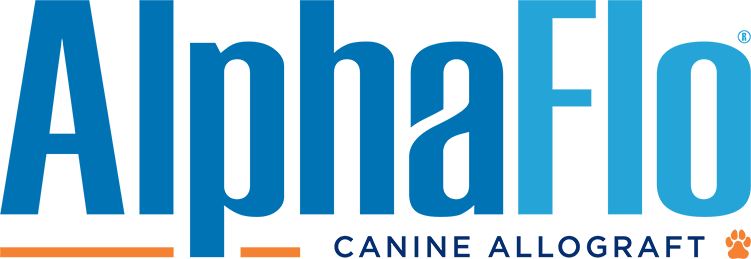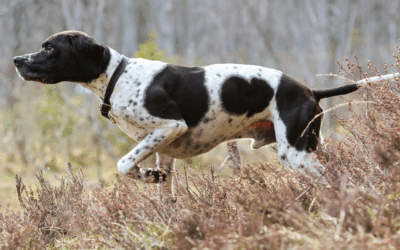AlphaFlo®
AlphaFlo® is a liquid, canine amniotic tissue allograft intended to supplement and protect tissues.
AlphaFlo® is a liquid, acellular, canine amniotic tissue allograft comprised of amnion intended to supplement and protect tissues.
AlphaFlo® is cryopreserved and provided frozen in three volumes.
Item Number | Size:
AF-010050 | 0.5 cc
AF-010100 | 1.0 cc
AF-010200 | 2.0 cc
Amnion is a rich source of biologically active factors including exosomes, cytokines, growth factors, and extracellular matrix proteins with reported anti-inflammatory, anti-fibrotic, and immunomodulatory properties that make it attractive for use in veterinary applications.1, 2
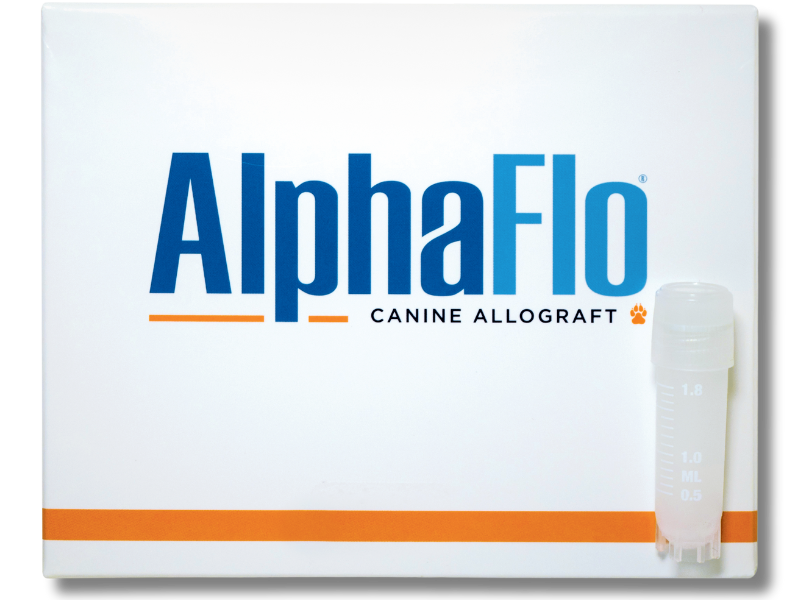
Biological Factors Identified in AlphaFlo®
AlphaFlo® is enjoying rapid adoption as a superior alternative to autologous and other therapies. Ready availability of an allograft potentiates clinical use without having time lapse for culturing cells or harvest techniques required for PRP and other autologous therapies. Due to individual variability within products such as PRP, cytokine and growth factor profiles can vary dramatically between patients. The reproducibility of each donor tissue also offers a more homogeneous protein concentration and product consistency in comparison to other regenerative modalities. AlphaFlo® is cryopreserved and maintained frozen before use, to preserve beneficial proteins that may not survive lyophilization. Clinicians currently managing injuries with PRP or autologous therapy should consider use of AlphaFlo® to achieve similar or improved clinical outcomes.

A2M
Alpha-2-Microglobulin. Potent inhibitor of pro-inflammatory cytokines including IL-1, and non-specific protease inhibitors including matrix metalloproteinases responsible for cartilage degradation.
IL-1ra
Interleukin-1 Receptor Antagonist. Potent anti-inflammatory cytokine. Inhibits the activity of interleukin-1 related immune and inflammatory responses.
IL-10
Interleukin-10. Potent anti-inflammatory cytokine. Inhibits the activity of interleukin-10 inflammatory response.
TIMP-2
Tissue Inhibitor of Metalloproteinases-2. Potent anti-fibrotic protein. Inhibitor of matrix metalloproteinases which are enzymes responsible for tissue destruction.
MCP-1
Monocyte Chemoattractant Protein-1. Chemokine protein involved in the recruitment and activation of monocytes, memory T-cells, and dendritic cells to sites of inflammation and injury.
Trappin-2
Protease inhibitor that plays a major role in controlling inflammation and protecting tissue damage.
EGFR
Epidermal Growth Factor Receptor. Protein that plays a crucial role in cell growth and division.
VEGF
Vascular Endothelial Growth Factor. Potent stimulator of angiogenesis and key player in wound healing and tissue regeneration.
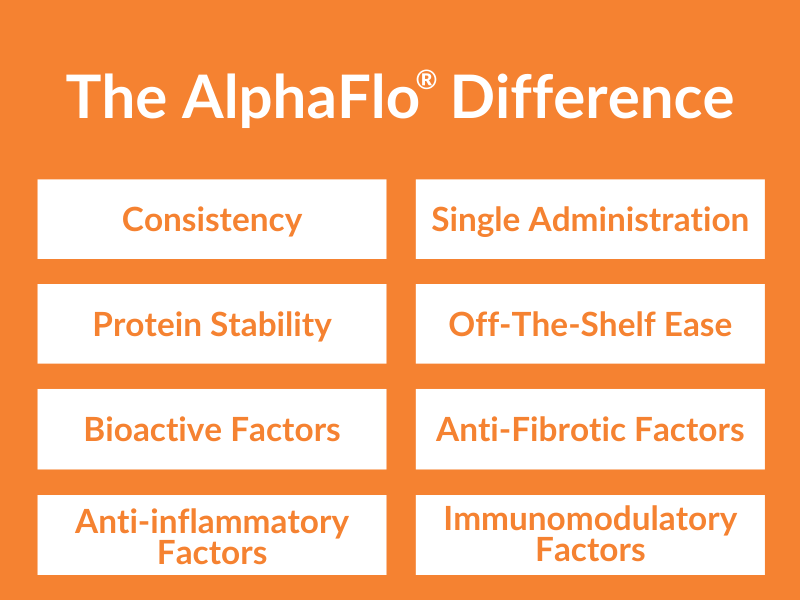
How Does AlphaFlo® Compare?
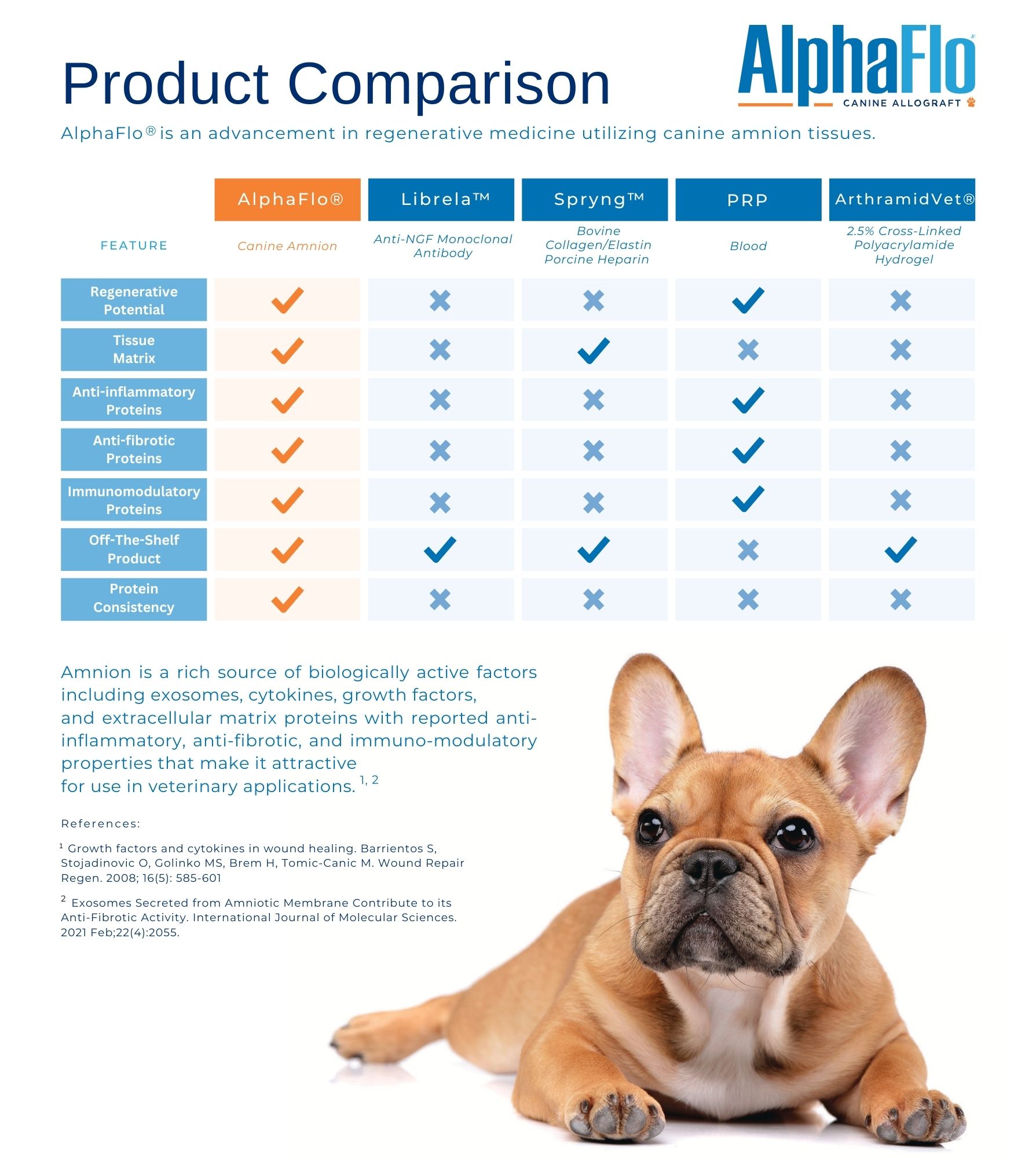
1. Growth factors and cytokines in wound healing. Barrientos S, Stojadinovic O, Golinko MS, Brem H, Tomic-Canic M. Wound Repair Regen. 2008; 16(5): 585-601
2. Exosomes Secreted from Amniotic Membrane Contribute to its Anti-Fibrotic Activity. International Journal of Molecular Sciences. 2021 Feb;22(4):2055.
Find AlphaFlo® near you from our nationwide network of providers.




Case Studies
CASE STUDY: Oral Squamous Cell Carcinoma
Case Presentation: On February 8, 2024, an 8-year-old, spayed female Doberman Pinscher presented with a mass on the right craniolateral mandible. Biopsy samples revealed a squamous cell carcinoma. At the discretion of the veterinarian, 2.0 cc of AlphaFlo® was...
CASE STUDY: Chest Wound
Case Presentation: On May 4, 2022, a two-year-old, spayed female German Shepherd Mix presented with a large wound/ laceration on the sternum. On initial presentation, the patient required tension relieving sutures, as the wound could not be completely closed. The...
CASE STUDY: Calcanean Tendon Lesion (RH)
On September 20, 2021, a 5-year-old, male English Pointer presented with soft tissue swelling with heat noted on point of right hock. The patient was 2/5 lame with some abnormal foot placement with right hind foot. Patient was treated with Low Level Laser Therapy and...
CASE STUDY: Tibial Plateau Leveling Osteotomy
14 Client-owned dogs with naturally occurring rupture of the cranial cruciate ligament underwent Tibial Plateau Leveling Osteotomy (TPLO), performed by Mark Besancon, DVM. Of the 14 dogs, 7 received 1.0 cc of AlphaFlo® intra-articular after closing of the arthrotomy...
CASE STUDY: Acral Lick Dermatitis (LF)
Case Presentation: In January 2024, a 3-year-old Hound Mix dog presented with an erythematous and alopecic skin lesion on the carpal joint of the left front limb. The lesion was diagnosed as an acral lick dermatitis, and the patient received 12 rounds of laser therapy...
Acral Lick Dermatitis (LF)
Case presentation: In January 2024, a three year-old Hound Mix dog presented with an erythematous and alopecic skin lesion on the carpal joint of the left front limb.
Oral Squamous Cell Carcinoma
Case presentation: On February 8, 2024, an 8-year-old, spayed female Doberman Pinscher presented with a mass on the right craniolateral mandible.
Tibial Plateau Leveling Osteotomy
14 Client-owned dogs with naturally occurring rupture of the cranial cruciate ligament underwent Tibial Plateau Leveling Osteotomy (TPLO), performed by Mark Besancon, DVM.
Chest Wound
Case presentation: On May 4, 2022, a 2 year old, spayed female German Shepard Mix presented with a large wound/laceration on the sternum.
Calcanean Tendon Lesion (RH)
Case presentation: On September 20, 2021, a 5 year old, male English Pointer presented with soft tissue swelling with heat noted on point of right hock.
